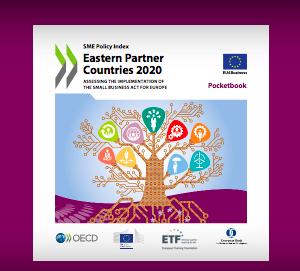
A new OECD report on small and medium-sized enterprises (SMEs) policies in the six countries of the European Union’s Eastern Partnership (EaP) finds that recent years have seen substantial progress in creating better conditions for SMEs but that governments can do more to create a competitive level playing field for firms of all sizes. Anti-corruption, competitive neutrality and better monitoring and evaluation of policy interventions are particular priorities.
The report comes at a time where SMEs globally are under pressure as a result of the Covid-19 pandemic. The immediate economic impact of containment and social distancing measures has been significant, particularly on SMEs which are important drivers of job creation and economic development (find here OECD analysis on the impact of Covid-19 in the Eastern Partnership). The OECD estimates that the decline in the level of output is equivalent to a decline in annual GDP growth of up to 2 percentage points for each month that strict containment measures remain in place. Moreover, SMEs in the EaP are strongly represented in sectors, such as tourism, transport and retail, which are particularly affected by measures to contain the further spread of the virus, as well as in textiles and food production, where integrated supply chains and short delivery times are essential.
While effective stimulus and emergency support will be critical in the short term, sustained and strategically focused SME policies will be needed to ensure the sector’s longer-term recovery. The OECD stands ready to support EaP governments in these unprecedented times to build stronger economies in which SMEs can thrive and identify policy solutions to soften the impact of the Covid-19 crisis on SMEs.
The new report, the SME Policy Index: Eastern Partner Countries 2020, finds that running a business is now becoming easier in EaP countries. Since the previous edition of the Index published in 2016, EaP countries have made significant progress in building a more SME-friendly business environment. Across the region, governments have made considerable progress in strengthening SME policy making through the design of SME strategies and the implementation of SME-friendly regulations. In addition, five out of the six countries have now established specialised SME agencies providing tailored support to entrepreneurs.
Country progress highlights include:
- Georgia, top performer. Georgia provides the healthiest conditions for SME development. Its SME Development Strategy 2016-2020 has led to continued reforms, such as the simplification of business registration, the expansion of support programmes for export-oriented and innovative SMEs, and a notable increase in e-government services.
- Ukraine, top reformer. Starting from a relatively low base in 2016, Ukraine has now caught up with regional peers through important reform initiatives in areas, such as deregulation, public procurement and bankruptcy procedures.
- Moldova has further simplified business-related regulations and introduced new support programmes for SME greening and for women and youth in business.
- Belarus has adopted its first SME Development Strategy and advanced in simplifying SME-related regulations.
- Azerbaijan has established a full-fledged SME development agency and significantly expanded its e-government services.
- Armenia has implemented an e-procurement system and significantly improved the collection and production of SME-related statistics.
Still, in order for firms to sustain this progress, EaP countries will need to continue their reform efforts and work harder to create a level playing field for SMEs. In this context, much still needs to be done to fight corruption and to ensure business integrity, as well as competitive neutrality and equal access to inputs and markets for firms of all sizes and ownership structures. All countries will also need to work on providing a more demand-driven offering in their support programmes and build stronger monitoring and evaluation systems to improve transparency, accountability and to better tailoring policies to SME’s evolving needs.
Prepared as part of the EU4Business Initiative, this report is the culmination of two years of intensive research, policy dialogue and capacity building across the region within a joint effort of EaP governments, private sector and civil society with the OECD, the European Commission, the EBRD and the European Training Foundation.
For over 10 years, the OECD together with the EU, EBRD and the European Training Foundation have been working with the six EaP countries to support SME policy reforms and bring them closer to EU standards. Since 2012, the SME Policy Index has been an important tool for policy makers in the region and development partners seeking to design and deliver better SME-support policies.
Visit the publication website: oe.cd/smepiEa
For further information on how to support SMEs in times of Covid-19 please also visit:
http://www.oecd.org/cfe/COVID-19-SME-Policy-Responses.pdf
